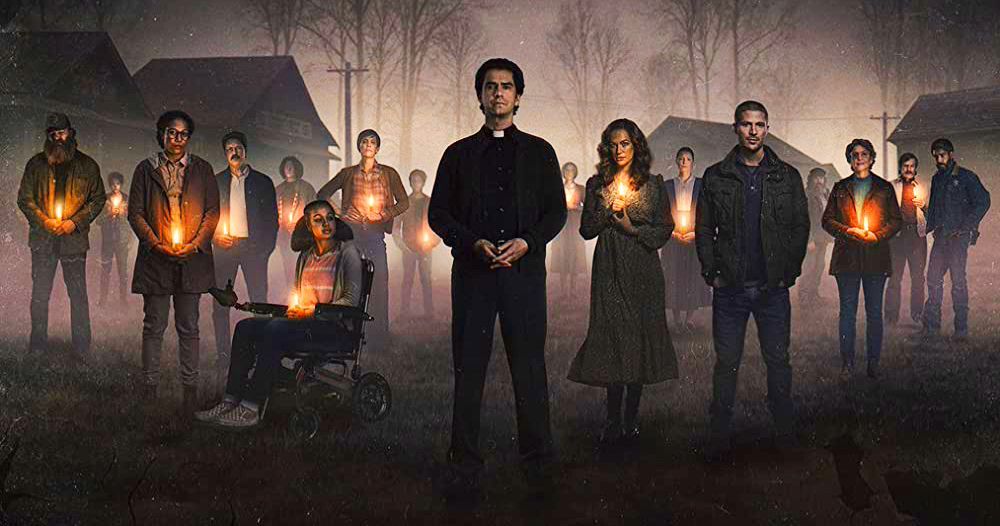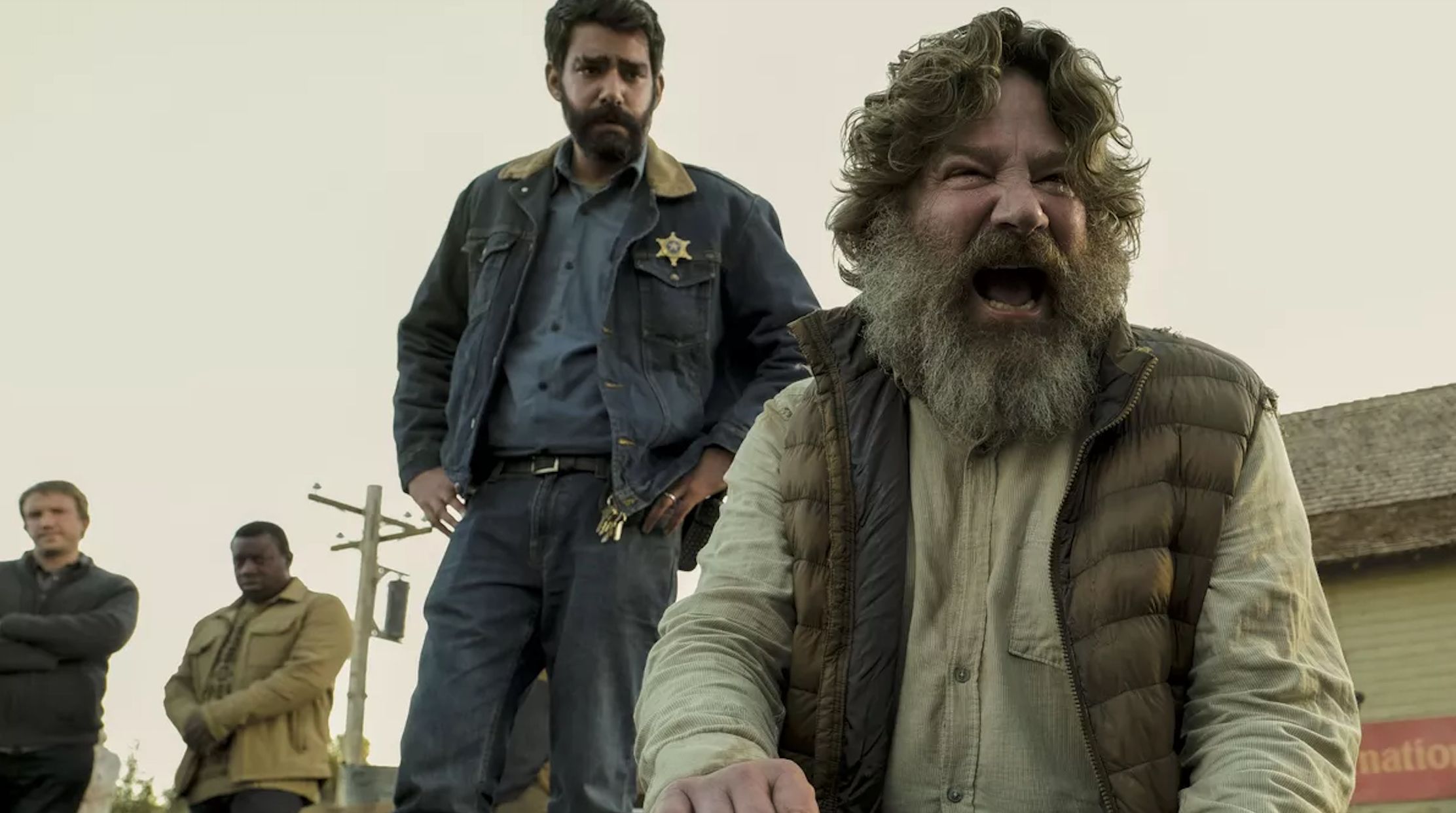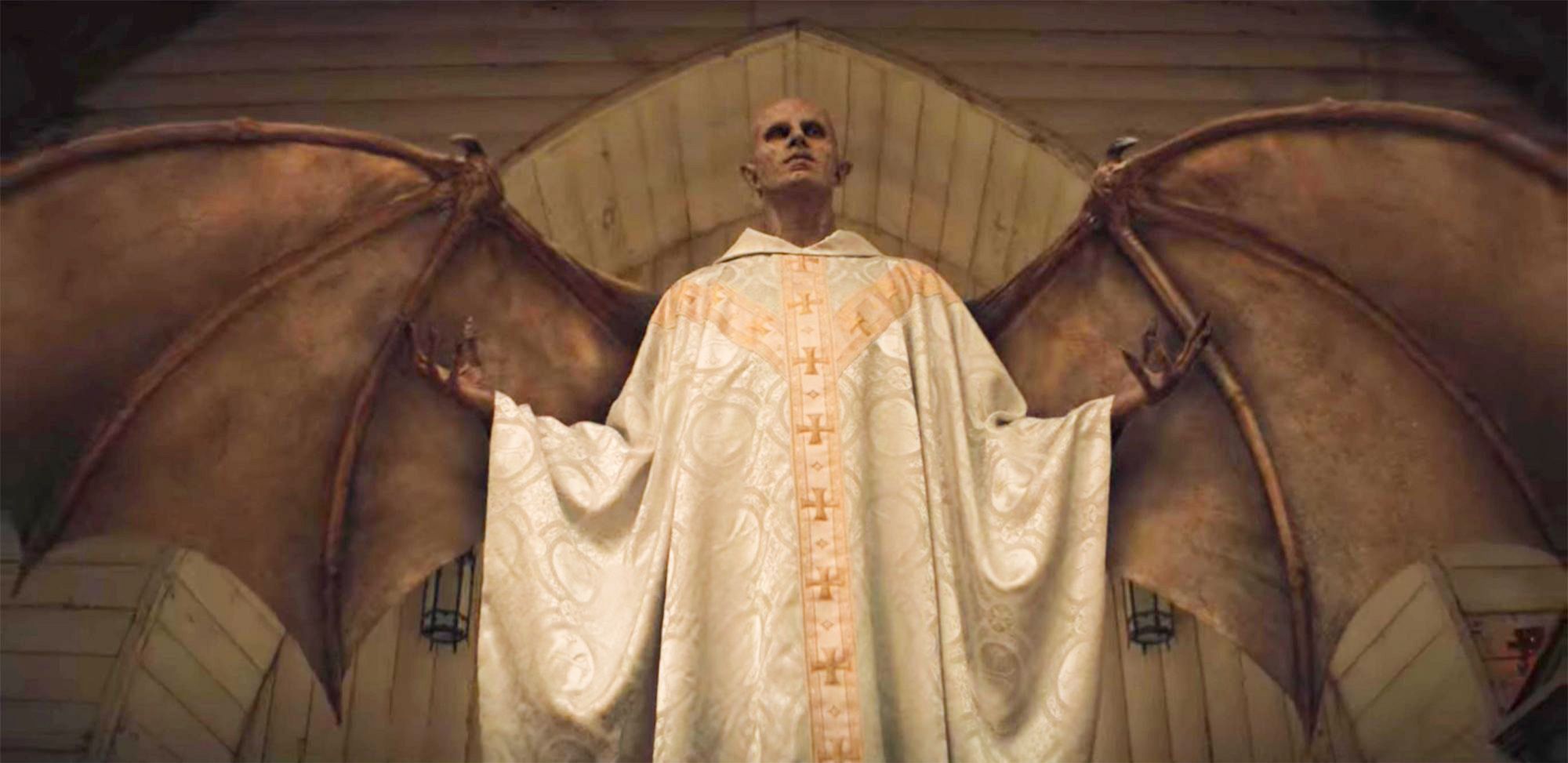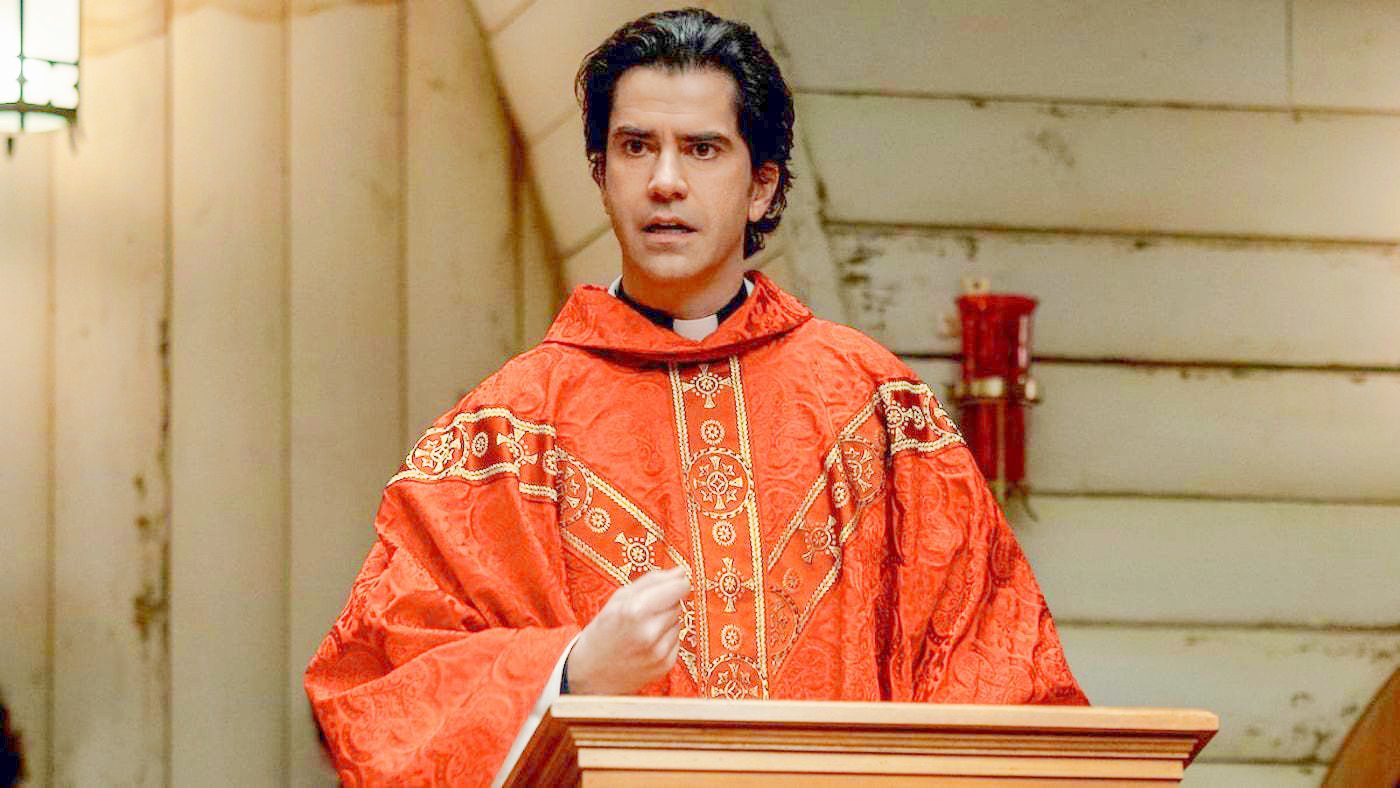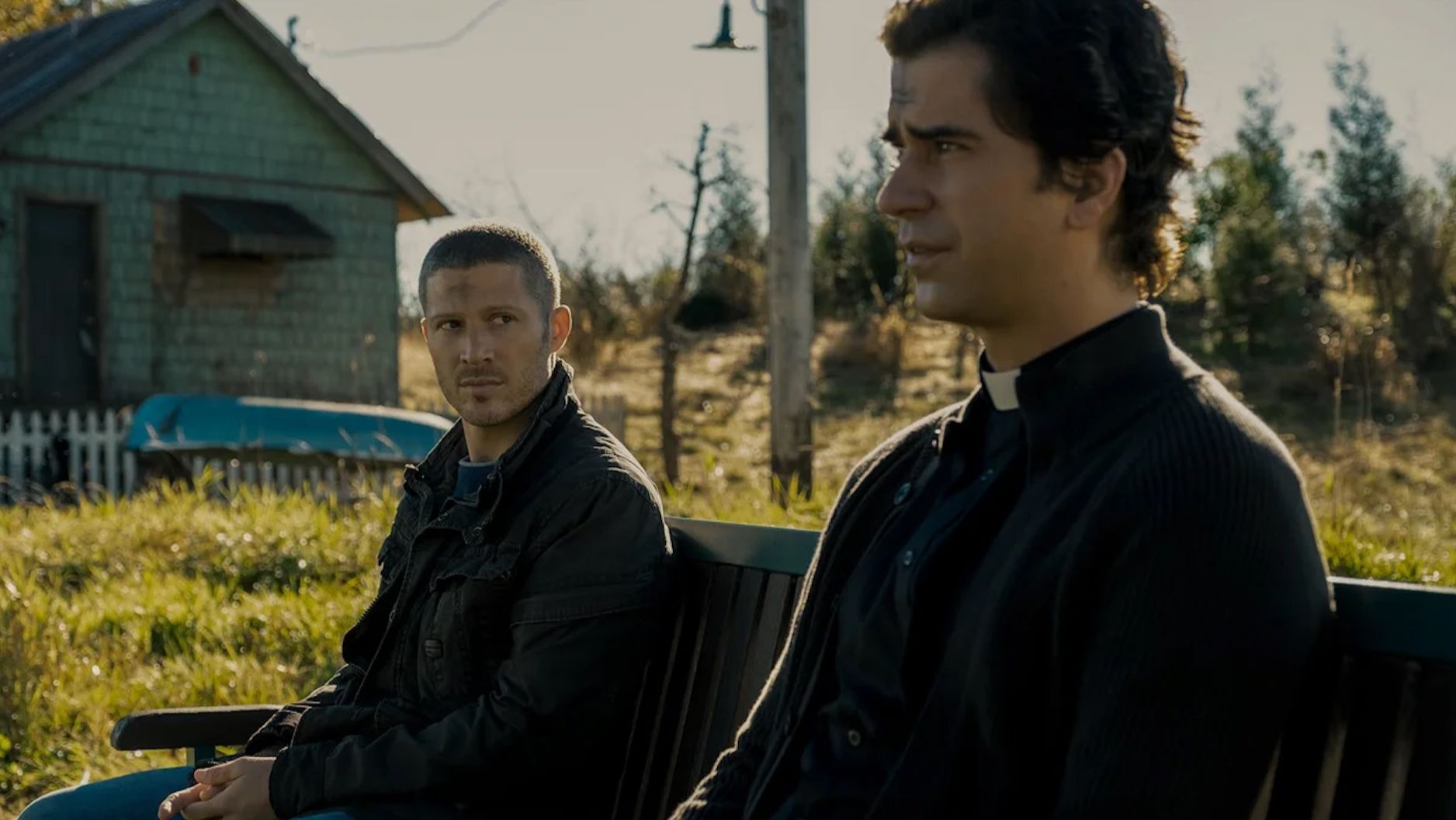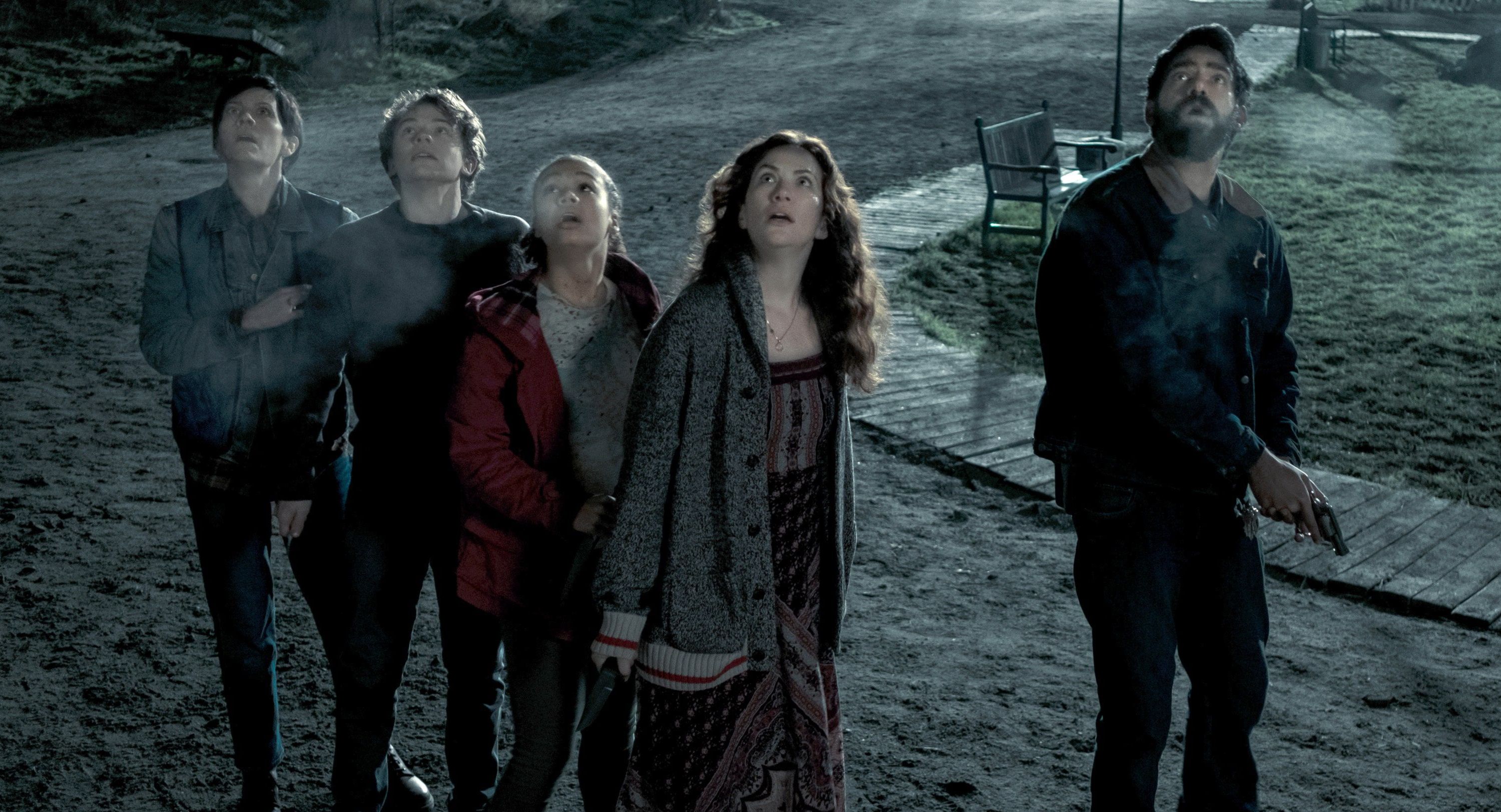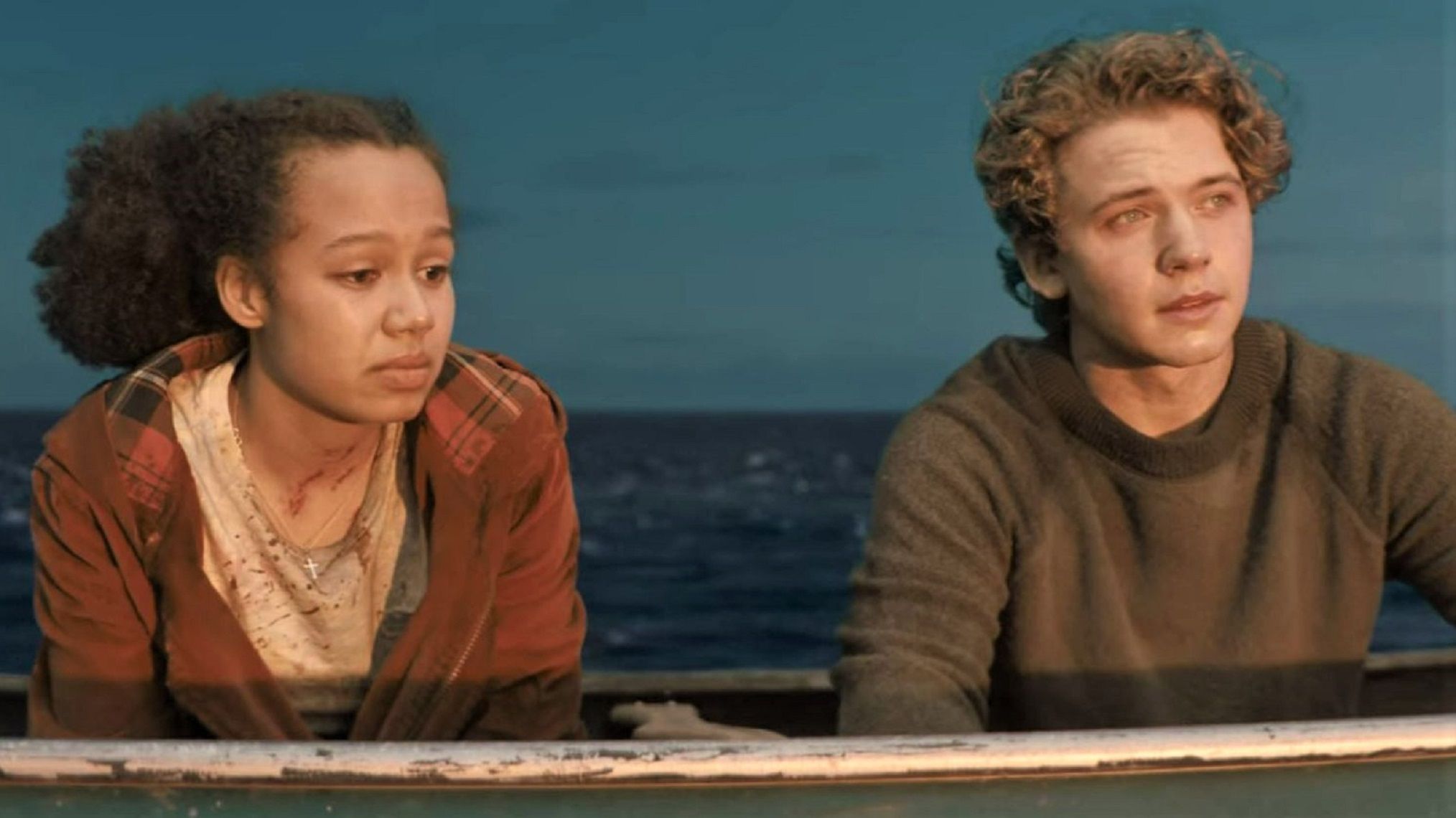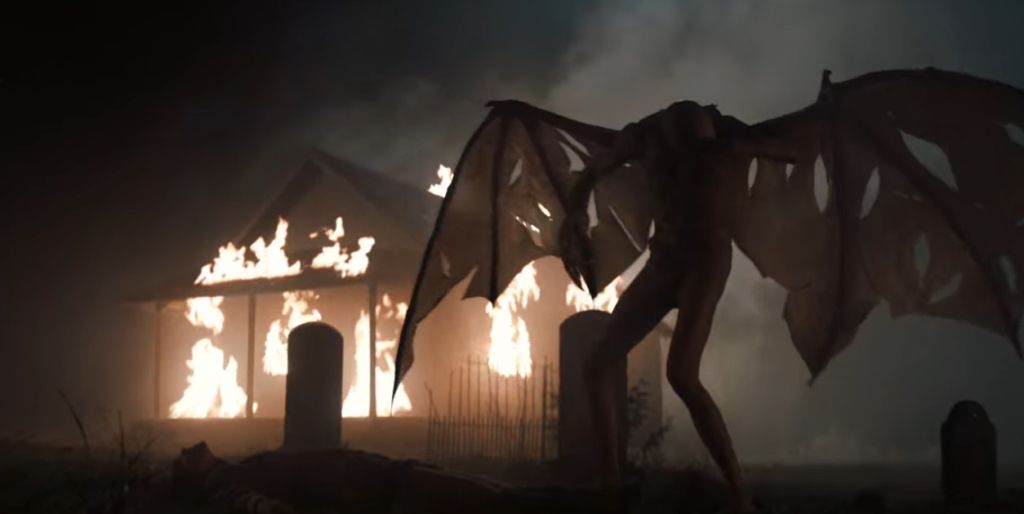After two stunning efforts with The Haunting of Hill House and The Haunting of Bly Manor, Mike Flanagan is back with yet another horror series, Midnight Mass, that many are already calling a masterpiece. While he's given fans some of their favorites within the genre, his newest limited series is the best of his three Netflix works. In this article, we will analyze the show in its entirety and give a breakdown of the story. Flanagan has proved that he can only get better at horror and this series' ending portrays that. We will discuss the final episode and the fates of most of the main characters; so be aware of spoilers. Not only will you get a better understanding of the story and how it all played out, you will also get to know the genius of Mike Flanagan and why his upcoming projects deserve close attention.
We will put a microscope up to Midnight Mass, breaking down Flanagan's story, his commentary on religion, and why critics are calling it, as previously mentioned, "his best work yet." Furthermore, exploring religion, we will discuss how he uses faith to portray his themes and why this sometimes tabooed subject is perfect for telling a horror tale of biblical (pun intended) proportions. If you haven't seen Midnight Mass yet, stop what you're doing and at least get started now. It's a short seven episodes; and you can find the rest of the fans here, where we're still looking for answers. Now for those who have binged it, loved it, and need more, don't worry. We're going to take an in-depth look at Midnight Mass and at what makes it so great.
The Tragedy Of Crockett Island
Midnight Mass follows the story of Crockett Island, a small, faith-based island community where Catholicism is intensely followed. More specifically, the story follows Riley Flynn's return to the "crock pot" after serving 4 years in prison for murdering a young girl while driving drunk. Losing his faith in prison after attempts to strengthen it, Riley, played by recurring Flanagan collaborator Zach Gilford, comes home during a time of strange and miraculous events. While the island welcomes one person back, it also receives a new visitor in Father Paul Hill, played by a fantastic Hamish Linklater, who is there to fill in for a "sick" Monsignor Pruitt, St. Patrick Church's pastor. The community gathers for Ash Wednesday, the first day of a 40-day Lent celebration, where they are introduced to Father Paul, learning about their monsignor's absence. While the island is adjusting to newcomers, everything seems fine; until some inexplainable things begin happeneing.
Miracles. Shortly after he informs Leeza, a known paraplegic, to swiftly stand up and walk - which she does - we learn a few things about Father Paul. During confession, Paul tells us about Monsignor Pruitt's trip to the Holy Land. In Damascus, Pruitt was hit by a sandstorm and forced into a cave where he met an angel, but not a glowing cherub. The dark, demon-like angel attacked Pruitt and feasted on his flesh, killing him. The angel then poured his blood into Pruitt's mouth, giving him new life. It's here where we learn that Father Paul is actually a young Pruitt, who aged about 40 years backwards. Bringing the angel back to Crockett Island in a locked chest with hopes to spread more new life, things begin to go awry. Although the island is filled with faithful Catholics, there are skeptics, like Erin, Riley's love interest who experiences a mysterious misscarriage, the town's doctor and medical expert, Sarah, and the unreligious Riley. While those that are doubtful attempt to find answers, Pruitt and his faithful followers are basking in all the good that has come to Crockett. But it's not quite what they think.
After Riley's dad loses his back pains and his mom regains her eyesight, he decides to investigate Pruitt, who he thinks is acting strange and not who he says he is. Although Pruitt has been meeting him regularly for AA meetings, Riley grows more suspicious of him when he is not seen for a few days. While the island slowly learns about Pruitt's secret, like the God-crazed Bev, Riley learns about more than just Father Paul's true identity. Looking for answers, he interepts a meeting between Pruitt and his saving angel. Riley is also attacked, eaten alive, killed, and brought back to life. Those who are given new life can only do so by feeding their urge to drink blood and, in the same respect, they are burned in the sunlight. While Pruitt believes God is passing through him, Riley sees through his intense beliefs and decides to tell Erin everything on a boat at sunrise. It's this very sunrise where Riley faces the afterlife and is burned alive, to ash, leading Erin to find out what's really going on. All of this is leading up to the Island's Easter Vigil, the day before Easter, at St. Patrick's Church.
The citizens of Crockett Island begin to choose sides toward the end. There's the faithful, which includes pretty much the entire St. Patrick's congregation and its leaders, Pruitt and Bev, and then there's those who aren't so easily persuaded, like Sheriff Hassan, Erin, and Sarah. While the island is gathering for the night Vigil, Sarah and Erin learn that the blood given as Communion causes light sensitivity, which we learn comes from one source - Pruitt's angel. In the sixth episode, Acts of the Apostles, Pruitt reveals himself to his people and asks them to all drink poison, sacrifice themselves, and be reborn. When several paritioners begin to drink it, Millie takes Hassan's gun and shoots Pruitt in the head, even though he has eternal life. The angel swoops in and takes Millie, while Hassan, Sarah, Erin, Leeza, Riley's mom, and his brother flee. Those that drank the poison die and come back; now the island is filled with blood-hungry humans, ring a bell?
In the final episode, Revelations, mayhem reaches its peak when Erin and company decide to burn Crocket to the ground so the infected cannot avoid the sun. While trying to survive the night, Erin is attacked by the angel and, sacrificing herself, cuts the angel's wings open before it hopelessly tries to fly away. As the sun is coming up, more become infected, leaving only Harrison and Leeza unscathed. Fleeing on a boat as the remaining folks sing a hymn, the island and its inhabitants accept its fate as a pile of ashes.
The Real Monster On Crockett Island
The series' focus on Catholicism and ideas of religion was certainly not meant to be subtle. With the show being called Midnight Mass and its episodes named after books of the Bible, it's no wonder Catholic references and annoyingly religious characters would be littered throughout its runtime. But Flanagan uses it as a tool to hide what is really threatening the island, which is actually a vampire apocalypse. Using Catholicism to drive the characters' actions, which we'll get into a bit more soon, Flanagan allows his villian to hide behind complicated themes of faith, Catholicism, life after death, and much more. He even hides it from his audience. Flanagan creates for his characters a religious dilemma between those who are quick to believe and those who are not. It's this dilemma, and the constant Christian undertones, that distract us from what's really happening.
Although it's all right in front of us, it's still difficult to understand the idea of a vampire. And, while a vampire taking over an island is miraculous enough, he uses religious miracles to make the audience question their own faith. Was it actually an angel? Is it the devil? Is Monsignor Pruitt Jesus? These are all questions that fans are susceptible to ask while watching, despite the real evil being more like Dracula. Even up to the last episode, while we think we're seeing the actual Revelation occur, it's really just Crockett's transformation into Dracula's Transylvania. The angel, who meets Pruitt in Damascus, bites him, becoming blood thirsty and sensitive to light. Although he looks alive, he is undead, in need of flesh and blood to survive. While viewers may pick up on the vampire plotline more easily than others, there is no mention of it in the series, proving Flanagan's mastery of religious commentary; something that deserves a larger discussion.
Catholicism As A Vehicle
In cinema and television alike, religion, especially Catholicism, has a close tie to the horror genre. Classics like The Exorcist and The Omen are staples of it, with demons and devils often featured as possessive antagonists. With Midnight Mass, Mike Flanagan uses religion to think outside of the box, introducing many more themes to the story and ideas for the audience to meditate on. Many religious horrors explore possessions and the main character's struggle with evil. And in the end, filmmakers tend to take a conservative look on things like Catholicism and how religion can save. That's not quite Flanagan's message. Rather than making us believe that our faith can save us, he makes us question it. Certainly, viewers were not siding with Bev and Pruitt who only wanted to drink blood and follow God. In the last episode, those who "believed" turned into the villians and those that were not consumed by their religion become protagonists. Unlike so many memorable films of the past, Flanagan takes religion in the theme and makes it the story itself, in this case, portraying it in seven chapters of the Bible.
Although Midnight Mass comes straight from the mind of Mike Flanagan, the main source material for the story would be the Bible; and it starts with Genesis. Genesis is the book of God's creation and how he made the earth in 7 days. In Midnight Mass, the book of Genesis is where Mike Flanagan creates his world, introducing us to Crockett Island. Within the seven-chapter story, Flanagan recites actual Bible stories, such as the transformation of Saul to Paul. Saul, in Damascus seeking to arrest followers of Jesus, is blinded by a light projecting the voice of Jesus. While Saul is blind for 3 days, he later loses the scales on his eyes and can see again. Officially a believer, Saul changes his name to Paul. We see the story of Saul play out in Monsignor Pruitt's journey in Damascus, who then changes his name to Paul, uncoincidentally, when he becomes young again.
Furthermore, Monsignor Pruitt, being Crockett's apparent savior, displays Jesus-like qualities in order to prove his ability to lead and spread the word of God. When Pruitt comes back as Father Paul, events of biblical proportions grace the island, like several stories of the Bible. Crockett, whose main industry is fishing, experiences a sharp increase in productivity and a surplus of fish; similar to Jesus teaching his men how to fish. Pruitt has the power to bring people back to life; not unlike Jesus' saving of Lazarus, who is mentioned in the show. But the key religious tales that become deeply rooted in the show's theme appear in the final few episodes, like the Passion of Jesus Christ (his death and resurrection on Easter) and Revelations (the final book of the Bible).
Centered around the Christian period of Lent, from Ash Wednesday up to Easter Sunday, the show starts with the first book of the Bible and ends with the last, adding the scripture's most important story in between. The Passion of Christ occurs when Jesus is asked by God to sacrifice himself, come back to life, and spread his message to the world, all for his people. Monsignor Pruitt, in Damascus, accepts his fate and is attacked by the angel. He is then given new life in what he thinks is God's calling. He returns to Crockett to spread his message and prepare his people not only for their Easter celebration, but also for the end of days.
The series finale is truly the island's revelation. An angel comes to Earth, like in the last book of the Bible, to save humans from God's rapture, or the end of the world. As Crockett Island burns to the ground and the angel finally reveals itself, the people too begin to prepare for the rapture. Falling into hysteria, they follow Pruitt's word to drink the poison and weed out those who refused, making way for God's people to enter Heaven. And finally, the people on the island face their fates of apocalypse, burning to ashes. Despite the survival of Harrison and Leeza, mostly every character meets their end in a pile of ashes. And, with the show starting on Ash Wednesday, those same characters "remember that they are dust and to dust they shall return" - which is what every priest says when administering ashes on Ash Wednesday.
While many critics are torn between the effectiveness of Flanagan's Christian angle to tell his story, he most certainly hits the mark when it comes to portraying the themes he intended to. Even though his religious allegories may be in your face, he combines horror and religion unlike any filmmaker before him. He keeps important Christian undertones throughout the story, ultimately driving it to be more comprehensive for the viewer. He uses religion to immerse viewers, making them question themselves more and more as the plot thickens. Regardless of the show's critiques, job well done by Flanagan; but it wasn't just Flanagan who came to play.
The Performances Were Evangelistic
With Riley Gilford returning to a Mike Flanagan script, it's newcomer Hamish Linklater, as Monsignor Pruitt, who steals the show. Furthering the story's religious undertones, Linklater's performance is harrowing in the best way possible. His monologues are what sell him as the series' showstopper. Whether it's his intimate, lonely confessionals about his religious struggles, or his demonstrative sermons at St. Patrick's masses, Linklater embodies the role of Pruitt and takes it a step beyond any normal preacher. His Good Friday homily, the day Jesus is crucified, is arguably his most impressive. He is attempting to rile up the paritioners of St. Patrick's to join God's army. Adding a crescendo to every next word, Linklater's preaching is ascertive and convincing. It is also a turning point for several characters in the story, urging them to take hold of their faith and join the army. Further promoting God's army, he advises his people to sacrifice as Jesus did and accept God's will, which changes and dictates morality because "God will ask horrible things of you." With such precision, Linklater plants a seed for what the story will grow into, convincing characters, and audiences, to join God's fight.
One of those soldiers in God's army, and in the series, is Samantha Sloyan, who portrays Bev Keane. Aside from the angel, in the end, Bev becomes one of the main antagonists, taking Pruitt's plans to a new level and making her ultimate demise in the end pretty satisfying for viewers. But Sloyan's performance is undeniable, so much so that, in the future, it may be hard to separate the actress from the character. Just as ascertive and convincing as Linklater's Pruitt, Sloyan is a standout in Midnight Mass because of her collected acting style while being forced into irrational decisions, all by the grace of God. While her character is easily opposed, Sloyan's dedication to the role mirrors Bev's dedication to faith and Monsignor Pruitt. With a story that is bound to create powerful performances, there are so many characters that deserve recognition, but Linklater and Sloyan go above and beyond, and we can't wait to see more of them in the future.
How Mike Flanagan Writes And Portrays Horror
With Midnight Mass, Mike Flanagan proved that he can navigate the religious horror genre, but the series is yet another installment of his unique ability to portray horror that is real - making the genre scarier than ever. Before Midnight Mass's arrival, Flanagan inserted his unqiue horror techniques in his first acclaimed series, The Haunting of Hill House. The series' key horror element being the "Red Room," he introduced real life horror to the screen. Touching on grief, loss, and spirits in the afterlife, Hill House forced audiences to question these ideas, encapsulating our biggest fears in that very room. The show focuses on the house and its ability to project hallucinations and force characters beyond insanity. With grief and loss behind every turn, he makes viewers explore those ideas in the most horrific ways possible. Unlike traditional horror, Flanagan uses themes and existential questions to scare us, rather than actual paranormal activity or vengeful monsters.
Midnight Mass is no different. Combining grandiose horror with existential crises, Flanagan makes us face those issues in an intense cinematic environment. In one of the more intimate dialogues of the show, Erin and Riley imagine what they believe life after death entails. Putting a microscope to the ever-debated topic, Flanagan forces us to question the afterlife, accepting the unknown, like the characters. Asking this question, he raises a follow-up: Is faith the way to understanding life after death? Scattered throughout its runtime, the show raises thoughts on forgiveness. When facing apocalypse, characters are forced to survive, and audiences are forced to question what they would do in the same situation. Combining several existential issues in both the plot and the series finale, the horror of it all is magnified by its themes. Like Hill House, the show frames real life questions that humans have trouble answering within the horror genre and the two techniques work off each other, manifesting our biggest fears on screen.
Revelations: Who Survived And The Ending Explained
Introducing yet another theme, new life, the series ending demonstrates that meticulously. Let's start with who survived. The island's youngest inhabitants, Harrison and Leeza, are the only human survivors. When the older population of Crockett dies off, it's the younger generation that gets to see a new day, a new world, and ultimately, a new life. The angel is the third of the show's three survivors. But we won't assume that it actually survives the revelation. After Erin cuts its wings, the angel struggles to flee, and Harrison even states that the angel will most likely burn up in flight while attempting to reach the nearest shelter on land. So, to fans' delight, the angel probably perished, although we cannot assume so. If the angel is actually a vampire, it probably burned up. But if Pruitt's prophecy stands correct, the angel may have lived to see another day.
The series ends with Harrison and Leeza on a boat as the island is torched. After losing both their family and friends in the massacre, it's assumed that they are heading towards the mainland to start over and tell the story of Crockett Island. The final episode portrays the revelation of the island. It brings a biblical story that hasn't happened (yet) to life. The island is brought both peace and suffering throughout its 40-day Lent celebration. The religious tale comes to a climax and the remaining two characters are given new life. Despite only two of the characters making it off the island, the story has potential to be expanded immensely, but Flanagan has other plans.
The Fate Of Midnight Mass Season 2
While a reboot may be possible down the line, Flanagan has already started his next venture; or ventures. With two Netflix series in the works, Flanagan is solidifying his place in horror legend. With his fourth and fifth horror installments set to release in the coming years, he continues to give us new stories with new source material. One of his projects is called The Midnight Club, based on author Christopher Pike's novel of the same name. The story follows "a group of terminally ill teenage patients residing at Rotterdam Home, and together they create the Midnight Club. They meet in secret at midnight to tell horror stories. Together the group forms a pact, that whoever dies first would make the effort to contact the rest of the Midnight Club members from beyond the grave."
Flanagan has also taken the responsibility of adapting the stories of one of history's most prolific and horrifying authors, Edgar Allan Poe. His new series, The Fall of the House of Usher (also a short story by Poe), will adapt several of his stories. And, while we're only sure of one story he will adapt, we can expect to easily recognize Poe's classic storytelling in the new series.
Midnight Mass has become both an international phenomenon and a stepping stone for Flanagan's career. He bends the rules of traditional horror and introduces a whole new era of the genre. He brings visual storytelling to life and allows themes of religion to take the wheel on the journey. With the help of a stellar supporting cast, Midnight Mass further protects Flanagan's claim as one of this generation's horror heavyweights. Although we're sad it's over, we cannot wait for what's to come.

